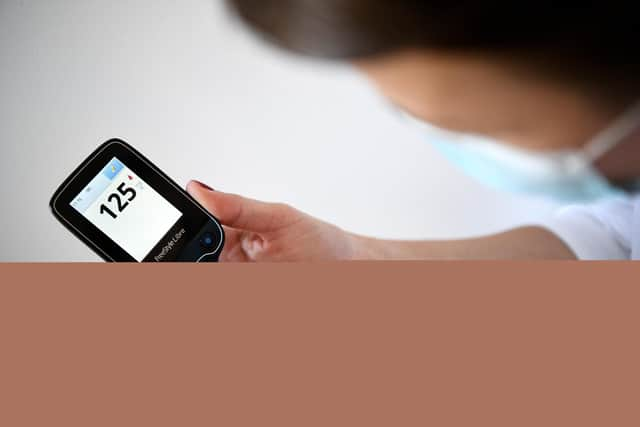100,000 diabetics in England to get ‘artificial pancreas’ on NHS which injects insulin via tracker
and live on Freeview channel 276
Auto-injecting blood sugar trackers will be handed to over 100,000 diabetics in England under a new NHS scheme.
The body-worn monitors, likened to an artificial pancreas, pump insulin into the body to help patients manage their blood sugar levels.
Advertisement
Hide AdAdvertisement
Hide AdThrough the hybrid closed-loop monitors, blood levels will be measured via the trackers and type 1 diabetics won’t need to use continuous glucose monitors or the finger-prick test to check their levels - or have daily insulin injections to treat the disease.


Professor Partha Kar, national speciality adviser for diabetes at NHS England, said: “This technology has been proven to give the best control for managing type 1 diabetes and should make things like amputations, blindness, and kidney problems possibly a thing of the past.
“We have seen fantastic results from the real-world trials which have taken place and thank you to Nice for their review of the evidence and subsequent conclusions. The quality of life this technology gives to those using it is huge.”
It comes as the National Institute for Health and Care Excellence (NICE) recommended the use of the technology for people who struggle to control their condition. It estimates that 105,000 people in England are set to be offered the technology – which costs around £5,700 per year.
Advertisement
Hide AdAdvertisement
Hide AdThe new loop system works by helping patients manage their blood sugar levels without having to monitor if glucose levels are too high or too low. It continually monitors blood sugar levels and transmits data to a “body-worn” insulin pump which delivers the right level of insulin to keep a patient’s blood sugar levels within a healthy range.
NICE’s new draft guidance states people who are unable to control their condition, despite using an insulin pump or real-time or intermittently scanned continuous glucose monitoring system, should be offered the technology - depending on their average blood sugar levels. Pregnant women are also eligible, it added.
Hypoglycaemia complications could become ‘thing of the past’
Officials said they hope complications linked to hypoglycaemia caused by type 1 diabetes – such as amputations, blindness and kidney problems – could become a “thing of the past” thanks to the technology.
Mark Chapman, interim director of medical technology at NICE, said: “Some people living with type 1 diabetes struggle to manage their condition, even though they are doing everything asked of them by their diabetes team.
Advertisement
Hide AdAdvertisement
Hide Ad“This technology is the best intervention to help them control their diabetes, barring a cure. Our committee has reviewed the real-world data generated by the NHS and evidence generated by randomised controlled trials which show there are clear benefits of recommending the technology’s use.”
Nikki Joule, policy manager at Diabetes UK, added: “Hybrid closed-loop technology has the potential to transform the lives of people with type 1 diabetes, improving both clinical outcomes and their quality of life.
“Nice’s draft guidance is a promising step towards ensuring people living with type 1 diabetes in England and Wales have access to the technologies they can benefit from most, helping them to manage their diabetes, avoid complications and live well with the condition.
“Type 1 diabetes can take a huge mental toll, with people manually calculating how much insulin they need regularly throughout the day. By automating these calculations, hybrid closed-loop technology can greatly alleviate the emotional burden of diabetes.
“We look forward to it being rolled out on the NHS and will work towards ensuring that everyone who could benefit from this life-changing technology has access to it.”
Comment Guidelines
National World encourages reader discussion on our stories. User feedback, insights and back-and-forth exchanges add a rich layer of context to reporting. Please review our Community Guidelines before commenting.
